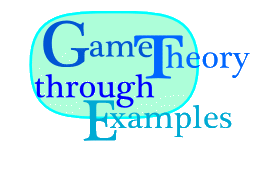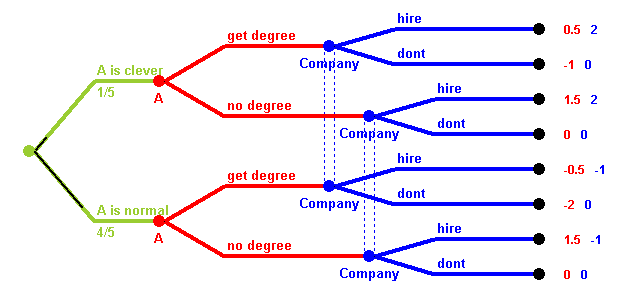


Incomplete Information

A game has incomplete information if not all players
know all payoffs of the other players.
Signalling Games
A version of Spence's Education Game:
Assume there are two kind of people: Clever people, able to learn fast and
with little "cost", and the normal kind. Furthermore assume that the clever
people are much more valuable for some high-level company. People decide
whether they want to get a (College) education, but note that whether they get it or not does
notaffect their value for the company. After having graduated (or not),
the company decides whether it wants to hire that particular person, but
the type of the person (clever or normal) is known only to the person but
not to the company. What happens? (compare [Spence 1973])
More precisely, we assume that p of the population is clever, that getting a degree costs
x units for the clever, and y units otherwise, with x < y. Getting the job at that high-level
company is worth z units of money. Of course, z must be larger than x,
othertwise nobody would bother to get an education. Furthermore, hiring a clever guy is worth v units
for the company, but hiring a normal person is worth w, usually w is negative).

The normal form of the game described above with p=1/5, x=1, y=2, z=1.5, v=2, w=-1 is shown to the right.
There are three Nash equilibria.
In the first, nobody gets an education, and the company hires
2/3 of those with education but nobody without. Since nobody gets an education, this means that
nobody is hired. The payoffs for emplyees and the company are both 0.
In the second equilibrium, nobody gets an education, and nobody is ever hired.
The payoffs are 0 and 0 again.
The third equilibrium is certainly the most interesting. Here clever people get
an education, but normal people don't. The company just hires educated people.
The average payoff for a person is 1/10, and the average payoff for the company (per person)
is 2/5. Since the company would want to hire somebody, this is what may happen.
The first two Nash equilibria are called "pooling equilibria", the third one is a
"separating" equilibrium. "Pooling" means that clever and normal people act the same way
(send the same signals), contrary to "separating".
See [Choo/Kreps 1987] for a different version of Spence's game with two
companies bidding for employees. This is also described in
[Noldeke/van Damme 1990].
A. Michael Spence is another one of our Bank of Sweden Nobel Prize
winners. He shared the 2001 prize with Joseph E. Stiglitz and George A. Akerlof.
His fame started with this article. Later he emphasized (see his Nobel prize talk)
that, different to his model, he does believe that education has some value
for employers :)
More links
- ...
- A.M. Spence, Job Market Signaling, Quarterly Journal of Economics 87 (1973) 355-374
- A. Michael Spence,
Markets with asymmetrical information, his Nobel prize speech. (2001)
- In-Koo Cho. David M. Kreps., Signaling Games and Stable Equilibria, The Quarterly
Journal of Economics, 102, No. 2 (1987) 179-222
- Georg Noldeke, Eric van Damme,
Signalling in a dynamic labour market,
Review of Economic Studies 57 (1990) 1-23.
- George A. Akerlof, The Market for 'Lemons': Quality Uncertainty and the Market Mechanism,
Quarterly Journal of Economics 84 (1970) 488–500.
- George A. Akerlof,
Writing the "The Market for 'Lemons'": A Personal and Interpretive Essay
- Francesco Caprioglio
"Lemons and fine cars" Applet
Exercises
- Ann and Beth work as a team. Selfish Ann has the possibility for an action
affecting both of their private incomes. Beth likes Ann---Beth's utility is the
minimum of both's incomes. After Ann decides about her action,
Beth may transfer some money to Ann. Show that even though Ann cares only about her
own available money (income plus present from Beth), if Ann plays the subgame perfect
equilibrium strategy she will move to maximize the sum of both's incomes.
[Kockesen]
 The normal form of the game described above with p=1/5, x=1, y=2, z=1.5, v=2, w=-1 is shown to the right.
There are three Nash equilibria.
The normal form of the game described above with p=1/5, x=1, y=2, z=1.5, v=2, w=-1 is shown to the right.
There are three Nash equilibria.



